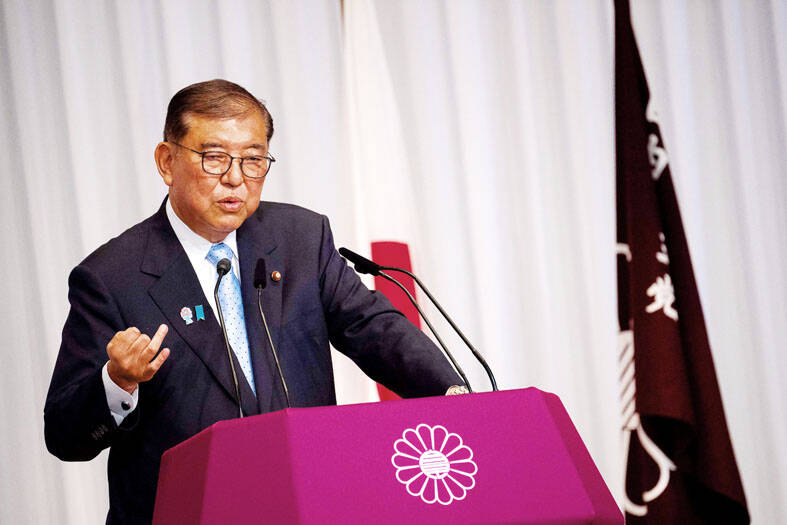Japanese Prime Minister Shigeru Ishiba yesterday vowed to remain in his post after his ruling coalition suffered a bruising defeat in upper house elections, prompting some in his own party to doubt his leadership as the opposition weighed a no-confidence motion.
The embattled prime minister told a news conference that he would remain in office to oversee tariff talks with the US and other pressing matters, such as rising consumer prices that are straining the world’s fourth-largest economy.
“I will stay in office and do everything in my power to chart a path toward resolving these challenges,” Ishiba said, adding that he intended to speak directly with US President Donald Trump as soon as possible and deliver tangible results.

Photo: AFP
However, analysts said that his days might be numbered, having also lost control of the more powerful lower house in elections last year, and shedding votes on Sunday to opposition parties pledging to cut taxes and tighten immigration policies.
“The political situation has become fluid and could lead to a leadership change or the reshuffling of the coalition in [the] coming months,” Oxford Economics lead Japan economist Norihiro Yamaguchi said.
Investors fear Ishiba’s administration would now be more beholden to opposition parties advocating for tax cuts and welfare spending that the world’s most indebted nation can ill afford.
The 68-year-old leader said he had no plans to expand his coalition, but would work with opposition parties to address voter concerns about inflation.
However, he cautioned that tax changes would not deliver the immediate help households need.
Adding to the economic anxiety, Ishiba’s lack of progress in averting tariffs set to be imposed by the US on Friday next week appears to have frustrated some voters.
“Had the ruling party resolved even one of these issues, [its approval rating] would have gone up, but we didn’t feel anything and it seems like the US would continue to push us around,” Hideaki Matsuda, a 60-year-old company manager, said outside Tokyo’s Shinjuku Railway Station yesterday.
Japan’s chief tariff negotiator Ryosei Akazawa departed for trade talks in Washington yesterday morning, his eighth visit in three months.
Ishiba’s Liberal Democratic Party (LDP), which has ruled Japan for most of its post-war history, and coalition partner Komeito returned 47 seats, short of the 50 seats needed to ensure a majority in the 248-seat upper chamber in an election where half the seats were up for grabs.
The leader of the main opposition Constitutional Democratic Party, Yoshihiko Noda, on Sunday said that he was considering submitting a vote of no confidence in the Ishiba administration as the result showed it did not have voters’ trust.
Some senior LDP lawmakers were also quietly voicing doubts over whether Ishiba should stay on, local media reports said.
Among them was former Japanese prime minister Taro Aso, leader of a powerful faction within the ruling party, who said he “could not accept” Ishiba staying on, TV Asahi reported.
“It is natural that there are various opinions within the party,” Ishiba said when asked about members of his party calling for his resignation.

Right-wing political scientist Laura Fernandez on Sunday won Costa Rica’s presidential election by a landslide, after promising to crack down on rising violence linked to the cocaine trade. Fernandez’s nearest rival, economist Alvaro Ramos, conceded defeat as results showed the ruling party far exceeding the threshold of 40 percent needed to avoid a runoff. With 94 percent of polling stations counted, the political heir of outgoing Costa Rican President Rodrigo Chaves had captured 48.3 percent of the vote compared with Ramos’ 33.4 percent, the Supreme Electoral Tribunal said. As soon as the first results were announced, members of Fernandez’s Sovereign People’s Party

MORE RESPONSIBILITY: Draftees would be expected to fight alongside professional soldiers, likely requiring the transformation of some training brigades into combat units The armed forces are to start incorporating new conscripts into combined arms brigades this year to enhance combat readiness, the Executive Yuan’s latest policy report said. The new policy would affect Taiwanese men entering the military for their compulsory service, which was extended to one year under reforms by then-president Tsai Ing-wen (蔡英文) in 2022. The conscripts would be trained to operate machine guns, uncrewed aerial vehicles, anti-tank guided missile launchers and Stinger air defense systems, the report said, adding that the basic training would be lengthened to eight weeks. After basic training, conscripts would be sorted into infantry battalions that would take

GROWING AMBITIONS: The scale and tempo of the operations show that the Strait has become the core theater for China to expand its security interests, the report said Chinese military aircraft incursions around Taiwan have surged nearly 15-fold over the past five years, according to a report released yesterday by the Democratic Progressive Party’s (DPP) Department of China Affairs. Sorties in the Taiwan Strait were previously irregular, totaling 380 in 2020, but have since evolved into routine operations, the report showed. “This demonstrates that the Taiwan Strait has become both the starting point and testing ground for Beijing’s expansionist ambitions,” it said. Driven by military expansionism, China is systematically pursuing actions aimed at altering the regional “status quo,” the department said, adding that Taiwan represents the most critical link in China’s

EMERGING FIELDS: The Chinese president said that the two countries would explore cooperation in green technology, the digital economy and artificial intelligence Chinese President Xi Jinping (習近平) yesterday called for an “equal and orderly multipolar world” in the face of “unilateral bullying,” in an apparent jab at the US. Xi was speaking during talks in Beijing with Uruguayan President Yamandu Orsi, the first South American leader to visit China since US special forces captured then-Venezuelan president Nicolas Maduro last month — an operation that Beijing condemned as a violation of sovereignty. Orsi follows a slew of leaders to have visited China seeking to boost ties with the world’s second-largest economy to hedge against US President Donald Trump’s increasingly unpredictable administration. “The international situation is fraught